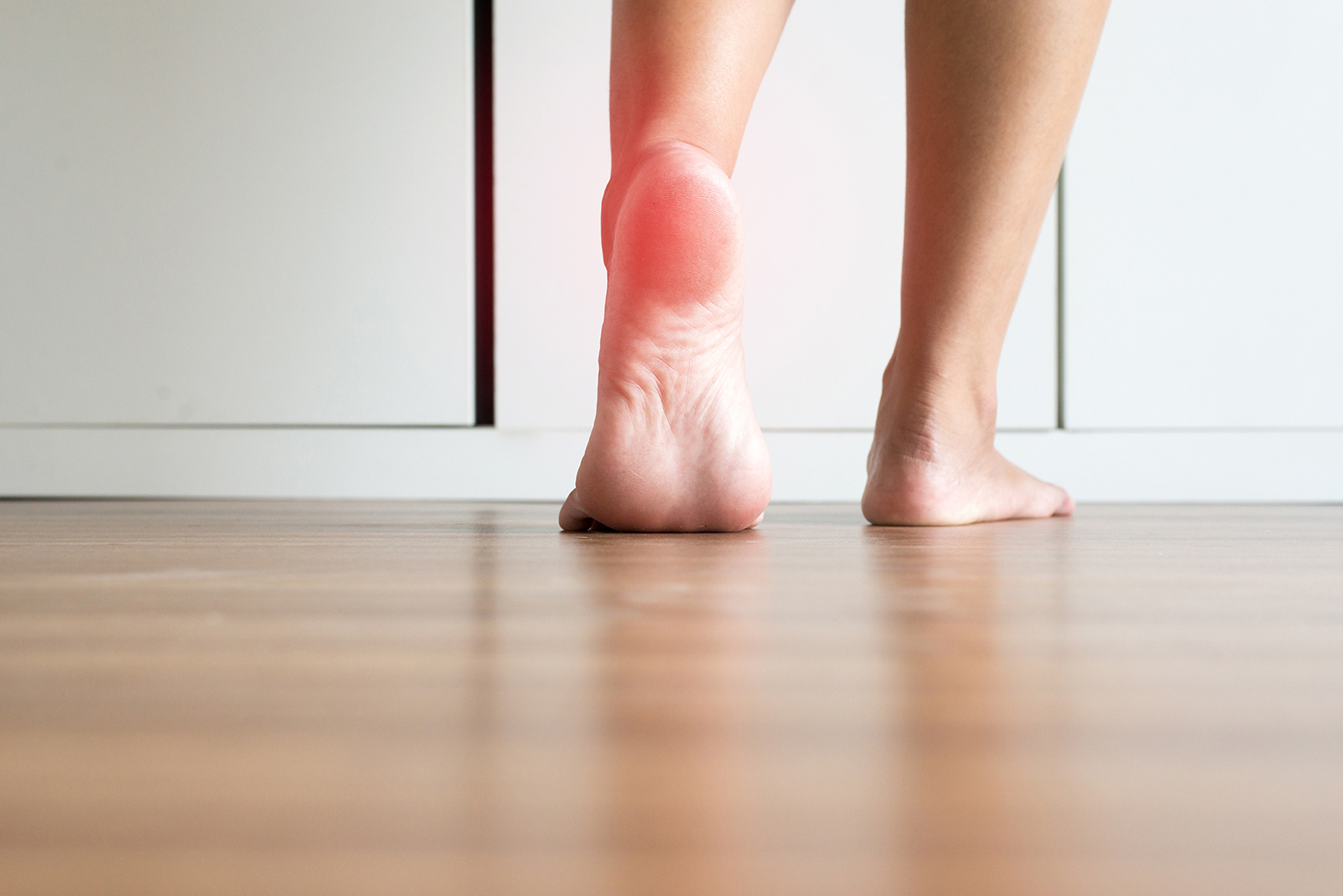Comprehensive Foot and Ankle Care in Vancouver
Expert Heel Pain Treatment in Vancouver, Washington
Our Vancouver Podiatrists Treat a Range of Ankle, Foot, and Nail Conditions
Common Causes of Heel Pain in Vancouver Patients
Our Vancouver Podiatrists Treat
Heel pain can result from various conditions affecting the heel bone, plantar fascia, Achilles tendon, or surrounding soft tissues. Understanding the underlying cause is essential for effective treatment. Our Vancouver podiatrists commonly diagnose and treat the following heel pain conditions:
Plantar Fasciitis
The most common cause of heel pain, plantar fasciitis occurs when the plantar fascia (the thick band of tissue supporting the foot’s arch) becomes inflamed or develops small tears. Learn more about plantar fasciitis and treatment options available at our clinic.
- Sharp, stabbing heel pain, especially with first steps in the morning
- Pain that improves with movement but worsens after rest
- Heel pain that increases after prolonged standing or walking
- Discomfort along the arch of the foot
Heel Spurs
Calcium deposits that form on the heel bone, often associated with plantar fasciitis. While heel spurs themselves may not cause pain, they can contribute to heel discomfort when they irritate surrounding tissues.
Achilles Tendonitis
Inflammation of the Achilles tendon causing pain at the back of the heel. This condition is common in athletes and active individuals. Our expertise in treating athletic injuries includes comprehensive Achilles tendon care.
Bursitis
Inflammation of the fluid-filled sacs (bursae) that cushion the heel bone, causing pain and swelling at the back or bottom of the heel.
Stress Fractures
Small cracks in the heel bone often caused by repetitive stress or overuse, particularly common in athletes and individuals with sudden increases in activity.
Nerve Entrapment
Compression of nerves in the heel area can cause burning, tingling, or shooting pain. Patients with neuropathy may be at increased risk for nerve-related heel pain.

Clover Podiatry provides comprehensive heel pain treatment in Vancouver, Washington, offering evidence-based solutions for plantar fasciitis, heel spurs, Achilles tendonitis, and other conditions causing heel discomfort. Our board-certified podiatrists use advanced diagnostic techniques and personalized treatment plans to deliver lasting pain relief and restore your mobility.
Heel pain affects millions of Americans and can significantly impact daily activities, work performance, and quality of life. Whether you’re experiencing sharp morning heel pain, chronic discomfort throughout the day, or heel pain that worsens with activity, our Vancouver podiatry clinic offers the expertise and advanced treatments needed to get you back on your feet comfortably.
Heel Pain Symptoms and Professional Diagnosis
Our Vancouver Podiatrists Treat
Heel pain symptoms can vary depending on the underlying condition. Accurate diagnosis is crucial for effective treatment, as different causes require different therapeutic approaches.
Common Heel Pain Symptoms
- Morning Heel Pain: Sharp pain with first steps after waking, often indicating plantar fasciitis
- Activity-Related Pain: Discomfort that worsens with walking, running, or standing
- Post-Rest Pain: Stiffness and pain after sitting or lying down for extended periods
- Swelling and Tenderness: Inflammation around the heel or arch area
- Radiating Pain: Discomfort extending from the heel to the arch or toes
- Pain with Pressure: Tenderness when pressing on specific heel areas
Comprehensive Diagnostic Process
- Clinical Examination: Thorough assessment of foot structure, range of motion, and pain patterns
- Biomechanical Analysis: Evaluation of walking patterns and foot mechanics
- Imaging Studies: X-rays, ultrasound, or MRI when necessary to visualize internal structures
- Pressure Testing: Assessment of pressure points and weight distribution
- Medical History Review: Analysis of symptoms, activities, and previous treatments
When to Seek Professional Care
Schedule an appointment with our Vancouver heel pain specialists if you experience:
- Heel pain lasting more than a few days
- Severe pain that interferes with walking or daily activities
- Pain accompanied by swelling, redness, or warmth
- Numbness or tingling in the heel or foot
- Pain that doesn’t improve with rest and over-the-counter treatments
- Recurring heel pain episodes
Why Choose Clover Podiatry for Heel Pain Treatment in Vancouver?
- Board-Certified Specialists: Experienced podiatrists with advanced training in heel pain diagnosis and treatment
- Comprehensive Diagnosis: Advanced diagnostic imaging and biomechanical assessment
- Personalized Treatment: Custom treatment plans tailored to your specific condition and lifestyle
- Advanced Therapies: Latest treatment options including shockwave therapy and minimally invasive procedures
- Local Vancouver Care: Convenient Vancouver, WA location with accessible parking
- Insurance Accepted: Most major insurance plans accepted

Advanced Heel Pain Treatment Options in Vancouver
Clover Podiatry offers comprehensive heel pain treatment options ranging from conservative therapies to advanced procedures. Our Vancouver podiatrists develop personalized treatment plans based on your specific condition, severity, and lifestyle needs.
Conservative Treatment Approaches
Most heel pain conditions respond well to conservative treatments, especially when addressed early. Our initial treatment approaches include:
Custom Orthotics
Professional custom orthotics provide targeted support and pressure relief. Learn about our custom orthotic services and how they can address heel pain.
- Arch support to reduce plantar fascia strain
- Heel cushioning for shock absorption
- Biomechanical correction to address underlying causes
- Activity-specific designs for work and sports
Physical Therapy and Stretching
- Plantar fascia and calf muscle stretching exercises
- Strengthening programs for foot and ankle muscles
- Range of motion exercises
- Home exercise programs for ongoing management
Activity Modification and Lifestyle Changes
For patients who experience heel pain from prolonged standing, learn about preventing foot pain from standing all day.
- Activity modifications to reduce heel stress
- Proper footwear recommendations
- Weight management guidance when appropriate
- Workplace ergonomic modifications
Advanced Treatment Options
When conservative treatments are insufficient, our Vancouver podiatrists offer advanced therapeutic options:
Injection Therapy
- Corticosteroid injections for inflammation reduction
- Platelet-rich plasma (PRP) therapy for tissue healing
- Targeted injections for precise pain relief
Shockwave Therapy
- Non-invasive treatment using acoustic waves
- Stimulates healing and reduces chronic pain
- Effective for plantar fasciitis and heel spurs
- Minimal downtime and side effects
Minimally Invasive Procedures
For severe cases that don’t respond to conservative treatment:
- Plantar fascia release procedures
- Heel spur removal when indicated
- Minimally invasive techniques for faster recovery
- Advanced surgical options for complex cases
Plantar Fasciitis: The Leading Cause of Heel Pain
Our Vancouver Podiatrists Treat
Plantar fasciitis accounts for approximately 80% of heel pain cases and is the most common condition we treat at our Vancouver clinic. Understanding this condition and its treatment options is essential for anyone experiencing heel pain.
Understanding Plantar Fasciitis
The plantar fascia is a thick band of tissue that runs along the bottom of your foot, connecting your heel bone to your toes. When this tissue becomes inflamed or develops small tears, it causes the characteristic heel pain associated with plantar fasciitis.
Risk Factors for Plantar Fasciitis
- Age: Most common between ages 40-70
- Foot Structure: Flat feet, high arches, or abnormal walking patterns
- Activity Level: Sudden increases in activity or prolonged standing
- Weight: Excess weight puts additional stress on the plantar fascia
- Occupational Factors: Jobs requiring prolonged standing or walking
- Footwear: Poor arch support or worn-out shoes
Specialized Plantar Fasciitis Treatment
Our Vancouver podiatrists offer comprehensive plantar fasciitis treatment including:
- Early intervention strategies for faster healing
- Custom orthotics designed specifically for plantar fasciitis
- Night splints to maintain proper positioning
- Advanced therapies for chronic cases
- Patient education for long-term management
Expected Recovery Timeline
With proper treatment, most patients experience significant improvement within 6-12 weeks. However, complete healing may take 6-18 months. Early intervention and consistent adherence to treatment recommendations lead to better outcomes and faster recovery.
Heel Pain Prevention Strategies
Our Vancouver Podiatrists Treat
Preventing heel pain is often more effective than treating it after it develops. Our Vancouver podiatrists recommend these evidence-based prevention strategies:
Footwear Guidelines
- Proper Arch Support: Choose shoes with adequate arch support
- Heel Cushioning: Look for shoes with good heel shock absorption
- Proper Fit: Ensure shoes fit properly with adequate toe room
- Activity-Specific Shoes: Use appropriate footwear for different activities
- Replace Worn Shoes: Replace shoes when the treads or support wear down
Stretching and Exercise
- Daily plantar fascia and calf stretching
- Strengthening exercises for foot and leg muscles
- Gradual increases in physical activity
- Proper warm-up and cool-down routines
Lifestyle Modifications
- Maintain a healthy weight to reduce foot stress
- Use supportive surfaces when standing for long periods
- Take regular breaks from prolonged standing or walking
- Address biomechanical problems early
Early Intervention
Don’t ignore early heel pain symptoms. Early treatment leads to better outcomes and can prevent chronic conditions from developing. Our Vancouver clinic offers prompt evaluation and treatment for new heel pain.
Frequently Asked Questions About Heel Pain
Our Vancouver Podiatrists Treat
Urgent Heel Pain: If you’re experiencing severe heel pain that prevents walking or is accompanied by signs of infection (redness, warmth, swelling), contact our Vancouver office immediately. We offer same-day appointments when available and can provide guidance on immediate pain management while planning your comprehensive treatment.
What causes heel pain?
Heel pain is most commonly caused by plantar fasciitis, which occurs when the plantar fascia becomes inflamed or develops small tears. Other causes include heel spurs, Achilles tendonitis, bursitis, stress fractures, and nerve entrapment. Biomechanical problems, improper footwear, and overuse can contribute to heel pain development. Our Vancouver podiatrists use comprehensive evaluation to determine the exact cause of your heel pain.
When should I see a podiatrist for heel pain?
See a podiatrist if heel pain persists for more than a few days, is severe enough to interfere with walking or daily activities, occurs with swelling or numbness, or doesn’t improve with rest and over-the-counter treatments. Early intervention leads to better treatment outcomes and faster recovery. Don’t let heel pain become chronic by waiting too long to seek professional care.
How long does heel pain treatment take?
Treatment duration varies depending on the condition and severity. Many patients experience improvement within 6-12 weeks with proper treatment, but complete healing may take 6-18 months for conditions like plantar fasciitis. Early intervention, consistent adherence to treatment recommendations, and addressing underlying causes lead to faster recovery. Our Vancouver podiatrists provide realistic timelines based on your specific condition.
What heel pain treatments do you offer in Vancouver?
Our Vancouver podiatrists offer comprehensive heel pain treatments including custom orthotics, physical therapy, injection therapy, shockwave therapy, and minimally invasive surgical procedures when necessary. We develop personalized treatment plans based on your specific condition, severity, and lifestyle needs. Conservative treatments are tried first, with advanced options available for resistant cases. Learn more about our complete range of foot and ankle treatments.
Can heel pain be prevented?
Many cases of heel pain can be prevented through proper footwear, regular stretching, maintaining a healthy weight, and addressing biomechanical problems early. Wearing supportive shoes with good arch support and heel cushioning, gradually increasing activity levels, and performing daily foot stretches can significantly reduce heel pain risk. Our Vancouver podiatrists provide personalized prevention strategies based on your risk factors and lifestyle.
Is heel pain surgery necessary?
Surgery is rarely necessary for heel pain and is only considered when conservative treatments fail after 6-12 months of consistent treatment. Most heel pain conditions respond well to non-surgical treatments including custom orthotics, physical therapy, and advanced therapies like shockwave treatment. When surgery is necessary, minimally invasive techniques are preferred for faster recovery and better outcomes.
Schedule Your Heel Pain Consultation in Vancouver, WA
Don’t let heel pain limit your daily activities or affect your quality of life. Our Vancouver podiatry clinic provides convenient access for patients throughout the greater Vancouver area, including surrounding communities in Washington and Oregon. We offer comprehensive heel pain evaluation and treatment with accessible parking and wheelchair-friendly facilities.
Address: 2205 NE 129th St, Vancouver, WA 98686
Phone: (360) 450-6644
Services: Comprehensive heel pain diagnosis and treatment
What to Expect at Your Heel Pain Consultation
- Comprehensive foot and ankle examination
- Biomechanical assessment and gait analysis
- Review of symptoms, activities, and medical history
- Discussion of pain patterns and triggers
- Diagnostic imaging if necessary
- Personalized treatment plan development
- Insurance verification and cost discussion
Preparing for Your Vancouver Heel Pain Appointment
- Bring shoes that you wear regularly, especially those worn when pain occurs
- Wear or bring typical socks and any existing orthotics or inserts
- List current medications, supplements, and medical conditions
- Note when heel pain occurs and what activities trigger or relieve it
- Bring insurance cards and identification
- Prepare questions about your heel pain and treatment options
- Complete new patient paperwork before your visit
Clover Podiatry Offers High-Quality Solutions for Heel Pain
Tackle heel pain with the help of our experienced podiatric team. Use our online contact form or call us at (360) 450-6644 to schedule your exam today. Same-day appointments may be available for emergencies. The medical professionals at Clover Podiatry are proud to serve patients from Camas, Salmon Creek, Battleground, Ridgefield, White Salmon, Carson, and the surrounding areas.


